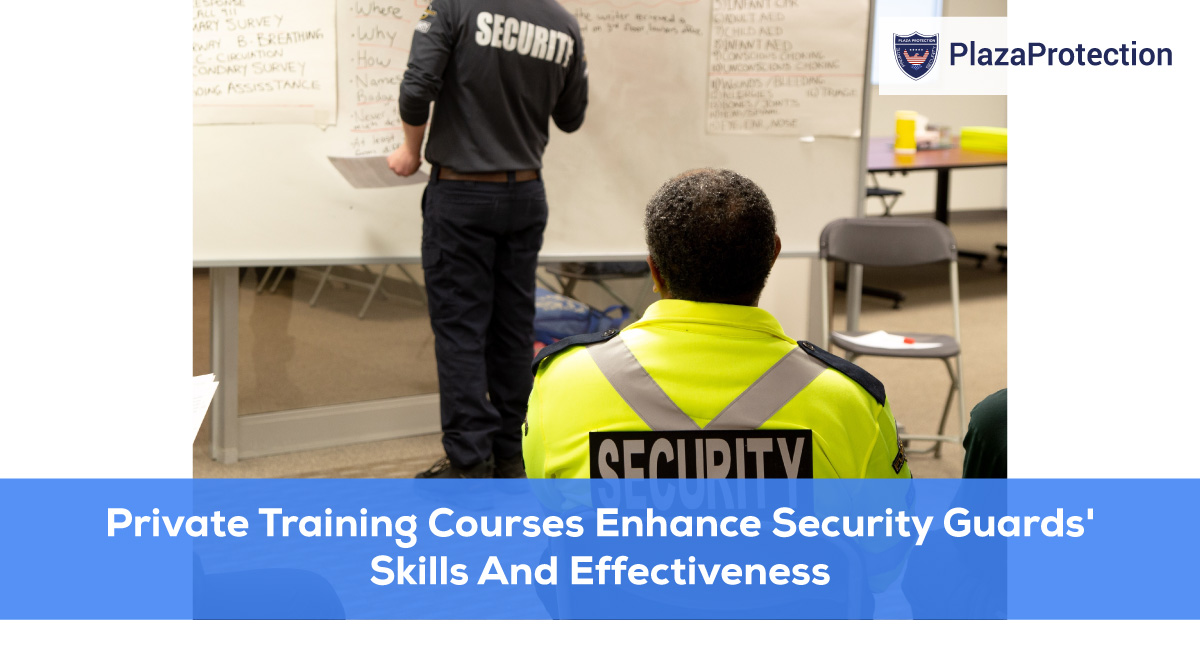Elevating Security By Making Your Security Guards Undergo Private Training Courses
While the terms “security officers” and “security guards” are often used interchangeably, their roles and responsibilities are distinct in the industry. Security officers go beyond the traditional watchkeeping and patrolling duties and are also responsible for customer service, de-escalation strategies, seeking help from law enforcement when required and much more. Such abilities are what sets them apart. Yet, acquiring such skills go beyond on-the-job experience. It necessitates extensive training to ensure that guards are equipped to handle any situation that arises. Fortunately, there are private training courses available to meet this need. In this blog, we’ll delve into what these courses entail and how they prepare security guards for the challenges they may face.
Physical Security And Crime Prevention
One of the primary elements of the security guard training revolves around understanding physical security principles and crime prevention strategies. Guards learn to identify vulnerabilities in premises, implement access control measures, and deter criminal activity through proactive surveillance and patrols.
Security Cameras, Access Control and Alarm systems
In an age where technology plays a crucial role in security, guards receive training in operating and monitoring security cameras, access control systems, and alarm systems. These learn to effectively utilize these tools to detect and respond to potential security breaches swiftly.
Investigation Of Incidents And Follow-Up
Security guards are often the first responders to incidents on-site. Training in investigation techniques equips guards with the skills to gather evidence, interview witnesses, and document incidents accurately. This information is essential for initiating follow-up procedures and assisting law enforcement if necessary.
Pepper Spray And Baton Training
In situations where verbal de-escalation is insufficient, guards may need to use force and apply non-lethal force to protect themselves or others. Training in pepper spray and baton usage ensures guards are proficient in safely and responsibly utilizing these tools when necessary.
Hazardous Materials And Fire Hazard Incident Response
Security guards must be prepared to respond to a wide range of emergencies, including hazardous material spills and fire hazards. Training in hazardous materials and fire hazard incident response equips guards with the knowledge and protocols to mitigate risks and ensure the safety of everyone on-site.
Emergency Action Plan and Incident Response
Preparation is key in emergencies. Guards undergo training in emergency action plans, including evacuation procedures, communication protocols, and crisis management strategies. This training enables guards to respond swiftly and effectively in high-stress situations.
Legal And Ethical Considerations
Guards undergo comprehensive education on relevant laws and regulations pertaining to their duties. This includes understanding the appropriate use of force, detainment procedures within legal boundaries, and respecting an individual’s privacy rights. By being well-versed in these aspects, guards can effectively execute their responsibilities while upholding legal and ethical standards.
First Aid And CPR
Basic first aid and CPR training are essential components of a guard’s skill set. This training enables guards to promptly respond to medical emergencies, providing immediate assistance until professional help arrives. By possessing these life-saving skills, guards can mitigate the severity of injuries and potentially save lives in critical situations.
Learning And Certification
Continuing to learn and recertification are essential for security guards. Regular training provided by security guard companies keeps them updated on industry best practices, technology and regulations, ensuring they remain proficient in addressing security threats.
Firearms Training
Armed security guards undergo rigorous firearms training to ensure safe and responsible usage. This includes marksmanship, weapon handling and legal considerations. With this preparation, armed guards can effectively respond to threats while prioritizing safety and adhering to legal protocols.
Crowd Control
Guards assigned to manage large crowds or events receive control techniques. This training focuses on maintaining order, ensuring safety of attendees, and managing potential risks associated with large gatherings. By mastering crowd control strategies, guards can effectively mitigate potential disruptions and uphold a secure environment for all participants.
Conflict Resolution
Conflict resolution training teaches guards to de-escalate tensions and resolve disputes peacefully. With effective communication and conflict management skills, guards minimize the risk of violence. Emphasizing diplomacy and empathy, this training maintains a safe environment.
On-The-Job Training
On-the-job training complements classroom instructions for security guards. New recruits shadow experienced guards, gaining practical skills, and real-world experience. This hands-on approach allows them to apply their knowledge, refine skills and adapt to job challenges.
Conclusion
In conclusion, the training of security guards and officers should be robust and comprehensive, involving a wide spectrum of essential topics, ranging from physical security to emergency response. By mastering skills in crime prevention, incident investigation, and emergency preparedness, security guards stand ready to fulfill their duty of protecting individuals, property and assets in a constantly evolving security landscape.
At Plaza Protection, we’re dedicated to ensuring our security officers are equipped with top-tier skills. Through comprehensive private training covering diverse security aspects, we empower our guards to excel in any situation they face. With us, you get a team prepared to uphold the highest security standards, offering peace of mind in today’s dynamic security environment.


Leave A Comment